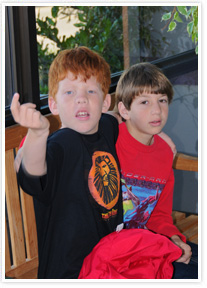The following is a list of some research projects that have been conducted at Children’s Workshop.
Whiteside, H., Thiss, S., Julian, D., & Green, G. (2004). Interspersed Presentation and Consumption of Non-Preferred Foods by a Child with Autism. Presented at the Association for Behavior Analysis International Conference, Boston, MA.
Hodges, S., Mays, J., Walk, J., Whiteside, H., & Traupmann, K. (2005). Function Based Assessment and Behavior Intervention in School Programs. Presented at the Association for Behavior Analysis International Conference, Chicago, IL.
Vick, V., & Whiteside, H. (2007). The Effects of Supplemental Computerized Reading Instruction on Reading Skill Acquisition by Young Children with Autism and ED/BD. Presented at the Association for Behavior Analysis International Conference, San Diego, CA.
Ritter, A., & Whiteside, H. (2008). The Effects of Video Modeling on Teaching Students with Autism to Offer Assistance. Presented at the Association for Behavior Analysis Conference, Chicago, IL.
Whiteside, H., Ritter, A., Martin, M., & Traupmann, K. (2009). Time-Out and DRL Combined Can Reduce Problem Behavior Without Compromising Academic Achievement. Presented at the California Association for Behavior Analysis Conference, Burlingame, CA.
Our data based approach to teaching commits us to determining whether what we do as teachers and therapists is actually working—that is, are the students learning. Moreover, much of our teaching methodology has already been validated by a substantial amount of systematic research. That nevertheless leaves interesting questions, some of which we can address in our own systematic research efforts. However, because we do not obtain funds for conducting research, we have no research assistants. All of our empirical work is done by our staff members and, because it is done with our students during the school day, it necessarily is directly related to their needs as expressed in their IEPs, which we consider to be effective and efficient instruction.
Gilmore, S., (2008). A Video Model Teaches Young Adults with Disabilities How to Organize Materials and Prepare a Simple Meal. Thesis submitted in partial fulfillment of a Master’s degree at San Diego State University. Click for PDF.
Hodges, S., Mays, J., Walk, J., Whiteside, H., & Traupmann, K. (2005). Function Based Assessment and Behavior Intervention in School Programs. Symposium presented at the Association for Behavior Analysis International Conference, Chicago, IL.
McNally, A., Swope, J., & Traupmann, K. (2011). Skype as a Tool in Functional Analysis. Poster presented at the Association for Behavior Analysis International Conference, Denver, CO. Click for PDF.
Ritter, A., (2007). The Effects of Video Modeling on Teaching Students with Autism to Offer Assistance. Thesis submitted in partial fulfillment of the Master’s degree at San Diego State University. Click for PDF.
Ritter, A., & Whiteside, H. (2008). The Effects of Video Modeling on Teaching Students with Autism to Offer Assistance. Poster presented at the Association for Behavior Analysis Conference, Chicago, IL.
Traupmann, K. L. (2009) Notes on self-management and how to teach it. Unpublished technical report. San Diego, CA: The Institute for Effective Education
Traupmann, K. L. (2006) Procedures training for students who are verbal. Unpublished technical report. San Diego, CA: The Institute for Effective Education Click for PDF.
Vick, V., & Whiteside, H. (2007). The Effects of Supplemental Computerized Reading Instruction on Reading Skill Acquisition by Young Children with Autism and ED/BD. Poster presented at the Association for Behavior Analysis International Conference, San Diego, CA.
Walk, J. (2004). Assessing The Most Effective Use of Video Modeling Within a Treatment Package for Adolescent Students with Autism. Thesis submitted in partial fulfillment of a Master’s degree at San Diego State University. Click for PDF.
Whiteside, H., Ritter, A., Martin, M., & Traupmann, K. (2009). Time-Out and DRL Combined Can Reduce Problem Behavior Without Compromising Academic Achievement. Poster presented at the California Association for Behavior Analysis Conference, Burlingame, CA.
Whiteside, H., Thiss, S., Julian, D., & Green, G. (2004). Interspersed Presentation and Consumption of Non-Preferred Foods by a Child with Autism. Poster presented at the Association for Behavior Analysis International Conference, Boston, MA.



